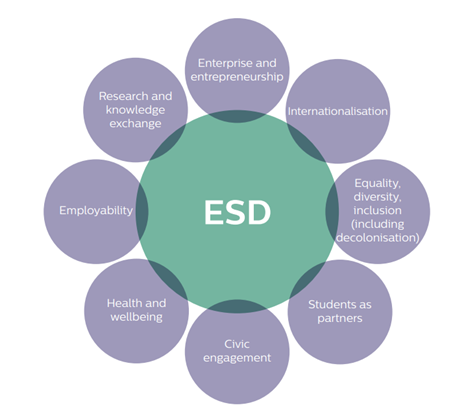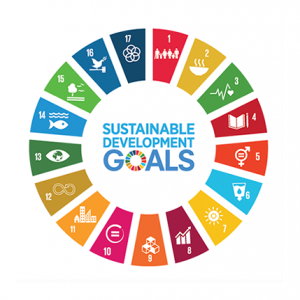About ESD
Defining ESD
Education for Sustainable Development is about ensuring that our graduates, regardless of their field of study, are equipped with the necessary skills and attributes to face global challenges.
While there are debates within the academic community about the concepts and definitions of ‘sustainability’ and in particular ‘sustainable development’ this toolkit is not designed to address them. The resources within are designed to foster the development of globally minded, sustainability literate citizens empowered to create solutions to global challenges. The ESD toolkit uses the lens of the UN Sustainable Development Goals to support staff to identify opportunities and integrate sustainability into learning and teaching.
“ESD empowers learners to take informed decisions and responsible actions for environmental integrity, economic viability and a just society, for present and future generations, while respecting cultural diversity. It is about lifelong learning, and is an integral part of quality education. ESD is holistic and transformational education which addresses learning content and outcomes, pedagogy and the learning environment. It achieves its purpose by transforming society”
UNESCO, 2019
It is important to note that ESD, is not solely about environmental issues, but focuses on the connections between economic, social and environmental factors and as such is relevant well beyond those disciplines and subject areas with obvious connections to environmental issues.
A key part of ESD is the development of competencies, that is, skills, attributes and values, and how they link to subject knowledge and knowledge of sustainability. Developing these competencies can be achieved through emphasising active learning pedagogies, including project-based learning and problem-based learning.
The most significant impact ESD will have is in supporting the knowledge, skills and competencies that students and staff develop to contribute to a more sustainable future. This can only be achieved by embracing ESD as part of a whole-institution approach.
- Supporting students and staff to develop the knowledge, competencies and ability to pursue sustainable visions of the future.
- Supporting students and staff to appreciate the complexity of our world, the ‘wicked problems’ that continuously emerge, and how they can personally and professionally contribute to positive change.
- Challenging, supporting and enabling students and staff to co-design solutions and drive change for sustainability
Why ESD?
Set against the backdrop of the adoption of the United Nations Sustainable Development Goals (2015-30) (SDGs) in 2015, understanding of the role of HE has developed significantly. The challenge is stark and includes a wide range of interconnected environmental and social issues such as global climate change, local and global biodiversity loss, depletion of natural resources, deforestation, air quality, access to water, hunger, gender equality, and widening inequalities of wealth, health and wellbeing. These are just some examples of key issues that pose existential threats to humanity and require wider and urgent attention in our curricula.
In 2015 we saw not only the introduction of the SDGs, but also the adoption of the United Nations Framework Convention on Climate Change Paris Agreement which committed the international community to limit global warming to preferably 1.5 degrees Celsius above pre-industrial levels – a challenge that cannot be met without education and research at the heart of solutions.
In 2019, UNESCO recognised the importance of ESD in meeting the SDGs through the adoption of a new global framework, Education for Sustainable Development: Towards achieving the Sustainable Development Goals, also referred to as ‘ESD for 2030’.
The international crisis of the COVID-19 pandemic changed the political landscape beyond recognition, with many calls to take the opportunity for ‘green’ recovery to build a better world.
In response to the increasing urgency around climate change and the ecological emergency, the UK Government has set a range of policy and legislation goals. A Green Future, the 25-year plan to improve the environment was published in 2018. This was followed in 2019 by the UK Government declaring a Climate Emergency and the passing of legislation for UK net-zero Greenhouse Gas emissions by 2050.
There is considerable evidence that students expect SD to be incorporated into their institutional practices and curricula. In the 2020 National Union of Students (NUS) Skills Survey, 91% of respondents agreed their place of study should actively incorporate SD – up from 88% in 2014; while 83% would like to see SD actively incorporated and promoted across all courses – up from 71% in 2014.
ESD in HE
When considering sector-based activity, reference has been made to the Education for Sustainable Development Guidance (Advance HE/QAA, 2021). This document was intended to assist staff in UK higher education providers (HEPs) seeking to incorporate Education for Sustainable Development (ESD) within their curricula. It represents a major update from the 2014 guidance and has been produced by an expert group drawn from across the sector, with the aim of supporting students from any discipline to acquire the knowledge, understanding and skills necessary to develop values and take actions to transition society towards sustainable futures. The guidance provides a framework to support curriculum design and general guidance on approaches to teaching, learning and assessment.
In addition to this guidance document, there are a wide range of useful benchmarks and existing toolkits available across Universities in the UK and beyond, which provide worthwhile reference points for integrating ESD. These include toolkits, frameworks, handbooks, resources and examples of best practice as listed in the resources links at the end of this report.
How ESD is framed across curricula will depend on the context of the activity and the commitment from the institution. There is an opportunity for ESD to reinforce other institutional objectives such as internationalisation and developing global perspectives; decolonising learning; promoting interdisciplinary and transdisciplinary learning; promoting employability and enterprise, and civic engagement; and championing equality, diversity and inclusion. In this respect, ESD offers an opportunity to frame curricula, harmonise such activities and provide the context in which all of these institutional priorities can find expression.

